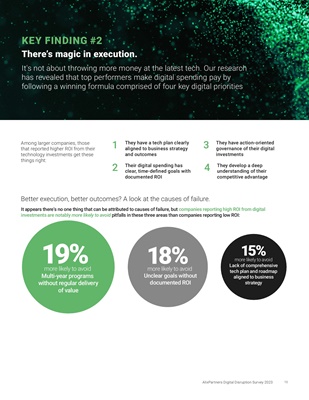
10 AlixPartners Disruption Index 2023
Is technology changing so fast companies cannot keep up? For many, the answer is yes.
But many others thrive on the speed of change, and those companies appear to be leaving their competitors behind.
Among disruptors, 73% feel able to keep up. Just 12% of laggards feel the same way. These companies-many of which are
also cutting digital spending-run a real risk of becoming left-behinds: casualties of digital disruption, unable to get back in
the race.
Smaller companies are particularly likely to find technological change daunting. Forty-one percent of large companies
say they drive disruption; 85% of small companies say they are reactive to it. Perhaps big companies' resource
advantages are enough to overcome the presumably greater nimbleness of smaller rivals.
Some executives are especially likely to fear falling behind. For example, executives within industrials (in which we
include everything from heavy industry (like automotive) to consumer products) are the most likely to express confidence
in their ability to keep up with technological change. Nearly half, 48%, disagree with the idea that change is happening
too quickly, (8 points higher than average). At the same time, however, industrial leaders are more likely than any other
industry group to fear being left behind. 16% say change is happening too quickly to keep pace. By way of contrast, that
figure for retailers is just 3%.
Left in the dust?
Larger companies (>$500M) are
almost three times more likely
to say they lead disruption than
smaller companies (<$500M)
of executives are confident they can
keep up with the pace of technology
ONLY 40%
True digital transformation
cannot be successfully achieved
in a silo. Efforts that are crossfunctional
and integrated across
the organization - with senior
sponsorship and accountability -
are the keys to success.
Jochen Gottschalk
Leader, Digital Germany